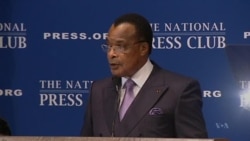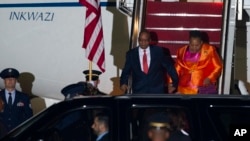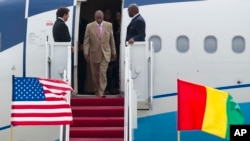President Obama will be welcoming more than 50 African leaders for a three-day U.S.-Africa summit to begin August 4 in Washington, D.C.
Not invited are the presidents of four countries with a record of human rights violations: Eritrea, Zimbabwe, Sudan and Central African Republic. The leaders of Sierra Leone and Liberia have canceled their trips because of the Ebola outbreak in their countries.
At the summit, the U.S. is expected to unveil nearly $1 billion in business deals, more funding for peacekeeping, and commit billions more dollars to food and power programs in Africa.
Administration officials say it’s an opportunity to discuss the future of an economically-growing continent, and address questions about how the U.S. can become a closer partner.
Themed “Investing in the Next Generation," the summit meetings will be designed to identify shared interests that will be needed if the continent is to meet the needs of its young people: health care, education, and work place opportunities.
Story continues after related video report by VOA's Miriama Diallo:
At a time when armed conflict has created a humanitarian emergencies in Central African Republic and South Sudan, and East and West African countries are fighting the spread of radical Islamists, the first goal is to ensure peace and stability needed for development.
Summit participants will discuss how to end violence and ensure both regional and domestic security.
That effort will include reforms to national militaries, says Joseph Siegle, research director for the Africa Center for Strategic Studies at National Defense University in Washington, D.C.
"There’s a recognition that part of the challenge is that Africa’s police and military aren’t always very professional, and this can lead to inappropriate or heavy-handed responses, especially when dealing with domestic security threats, which involve [the killings] a lot of innocent bystanders," he said. "This tends to alienate the local population and further fuel grievances."
"The challenge [for Obama and the heads of state] is how do you [separate and address] the domestic issues and then the transnational components of those threats?"
Trade, investment
On Tuesday, African leaders will meet with government officials at a business forum to address economic security. The gathering is expected to bring together 200 U.S. and African business leaders in order to find ways to strengthen financial ties by boosting trade and investment.
An important part of U.S. trade with Africa trade is the African Growth and Opportunity Act (AGOA), U.S. legislation designed to assist economies of sub-Saharan Africa and improve economic relations.
AGOA gives African countries with a good records of economic management and human rights duty-free access to U.S. markets. Today, Africa sells about seven thousand products to the U.S., worth about $27 billion.
More than 20 countries participate in AGOA, but U.S. officials say more could take part.
Experts such as Witney Schneidman, senior international advisor for Africa at the global law firm of Washington-headquartered Covington and Burling, says AGOA should be renewed for 15 years to ensure a stable investing environment.
"Another idea being considered by government officials is to enhance USAID trade hubs in Africa," he said, explaing that the hubs, or information centers, help African businesses export their goods to the U.S. market.
Schneidman also says they should be renamed trade and investment hubs that also help U.S. companies interested in the African market.
"Those trade hubs need to pull together," he said. "We need a whole of government approach so that you have our ambassadors and embassies in lockstep with our commerce and agriculture officials, along with officials from [the Export-Import Bank of the United States] and the [Organization of Petroleum Exporting Countries].
"[This way] we can present one face," he said. "A one-stop shop to U.S. companies on how the U.S. government can help them be successful in Africa."
Human rights
The summit agenad also includes a session on governance, though some activists say the current meeting schedule does not pay enough attention to human rights and democratization issues.
Civil society groups have voiced displeasure at not being invited to take part in any roundtable discussions with African leaders despite a civil society forum scheduled for Monday.
Adam Shapiro of the human rights group Front Line Defenders said U.S. emphasis on human rights and good governance is what should separate this gathering from recent Africa investment summits held by China, India, Japan and Russia.
"In those summits, there were very low expectations from Africa that any kind of issues about governance or human rights or transparency would be brought up," Shapiro said. "But when it comes to the U.S., there is an expectation that these kinds of issues would be on the table."
Shapiro, who wants civil society to be a part of all discussions — especially those on security and good governance — also wants President Obama to publicly identify leaders who’ve gained power through elections and transparency, such as those in Liberia, Ghana, Tanzania and Botswana.
He and other activists have been critical of summit invitations to leaders accused of human rights abuses, such as Teodoro Obian Nguema, long-serving president of Equatorial Guinea, and Abdel Fatah al-Sisi, president of Egypt.
Unlike China’s recent Africa summit, the U.S.-hosted summit will have no one-on-one meetings between the president and the African leaders.
Administration officials say Obama will be spending the entire day meeting with leaders on Wednesday at the heads-of-state summit. Heads of state and business leaders will be able to meet with cabinet-level officials during some of the events.








